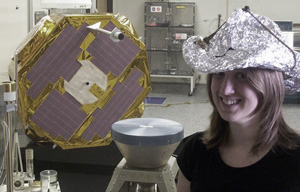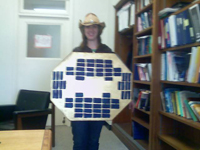Meet the IBEX Team: Christina Prested

PhD student Christina Prested always excelled at math and science, but she did not know what career path to choose until she visited FermiLab for an astronomy lecture while in high school. "I was good at math, but I didn't want to major in it, and I didn't like dissecting things, which ruled out medicine. I went to the lecture at FermiLab, and I had never heard ideas about the nature of the Universe before. It got me interested in astronomy," she said.
After graduating from the Illinois Math and Science Academy (IMSA), a public boarding school for talented Illinois students in grades 10-12, Christina earned a degree in astrophysics from Carnegie Mellon University. She decided to pursue a PhD in astronomy and applied to what she thought were the best schools - among them, Harvard and the Massachusetts Institute of Technology (MIT).

"There was a lot of competition for graduate schools that year, and I didn't get into Harvard or MIT. But I had come to Boston to visit, and I loved it, so I looked up other schools in the area and saw the [astronomy] department at Boston University (BU), which had a great space weather program. They were very gracious and let me apply months past the deadline, and they accepted me. The university has been really supportive, and they have taken me far - I feel lucky to be in the program," Christina said.
She feels that her strong math training helped her develop the skills necessary to do well in a graduate astronomy program. At IMSA, Christina took calculus her junior year, which allowed her to learn advanced mathematics her senior year. "I definitely had a very strong math background, and that made everything easier for a long time. I went to really excellent schools with support from government institutions. I got the best that was there," she said.
Christina recommends that college students hoping to earn PhDs should do two things: "Have a very strong mathematical background, because that goes a long way, and get as much [astronomy research] experience as possible. I regret not doing real work as an undergrad," she said.
Today, Christina does real work as a research assistant for Nathan Schwadron, a professor at BU and a co-investigator for the IBEX mission. Currently, she is writing a paper that describes the science team's predictions for what a map of what the heliosphere might look like, based on data the IBEX spacecraft may collect after it is launched in July. She is also gathering information about the IBEX instruments in order to make a model of them, and has been in training to process data collected by the IBEX spacecraft for the IBEX Science Operations Center.
This week, she is presenting a paper at the Polar Gateways 2008 Conference in Barrow, Alaska. She will describe a "best guess" of what the IBEX spacecraft might image of the heliosphere's poles. Her trip to the conference, located on the northernmost part of Alaska, required three airplane rides from Boston. Luckily, she believes that travel is the best part of a graduate student's job. "Definitely, getting to see the world, one piece at a time, is the best part of what I do. I get to have interesting adventures that most people don't get to have," Christina said.
In addition to traveling, Christina gives presentations and supports the mission by working on what she calls odds and ends. She said, "Recently, I needed to figure out if we are going to see Jupiter's magnetosphere with IBEX, which is unlikely, but we needed to know." She has also become the go-to person for information on the IBEX mission for students who wish to write papers about the spacecraft.
Participating in missions like IBEX was initially challenging for Christina. "[Being a graduate student] is very different from what I had experienced for my entire life before. Going from being a student to a collaborator was interesting and difficult. You have an idea of what your research is like, and you can surprise yourself with doing what you never thought you were capable of dealing with before," she said.
It helps that she has an outstanding faculty advisor to look up to. "My advisor is really inspirational. He's really young in his career and he has a crazy work ethic, but still is excited about [astronomy]," Christina said. She also admires Steve Irwin and other people "who are passionate about what they did, and could bring it back to a level that other people could understand and get excited about."
She aims to finish her PhD requirements in 2010, and hopes to write her dissertation on initial IBEX results or to report on its instruments. After that, she intends to find a postdoctoral fellowship, and focus on her foremost interest in astronomy: space weather.
Space weather that results from the Sun's activity could harm satellites and the communication systems that rely on them. "I try to excite people about space weather and the Sun in general because it is such an important part of our lives that we often ignore. The upcoming solar cycle might impact our society in a lot of ways because we are so built up with Global Positioning Systems (GPS) - even oil rigs in the ocean use them," Christina said. "In the future, I would like to be involved in a mission that gathers data on space weather. I love collecting real data, which is why I like working on IBEX."
She also enjoys telling people about her role on the IBEX mission. "I like to tell people about the fact that I'm working on a satellite mission and detecting something that came from 100 times the distance between the Earth and the Sun, and about the information we can get from it," she said.
Anticipating that innovations in commercial spaceflight will lead to advances in space tourism, Christina plans even farther ahead for a career in space tourism. "I have this dream to be a space tourism travel agent, I would love to be in on all the details of what's going on in space, and how to make it happen," she said.